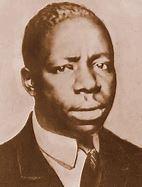Private Watson served in the United States Army and was killed in action during World War II. He was one of seven African American soldiers to be awarded the Medal of Honor for their actions during World War II, and the only one of the seven to earn his medal while serving in the Pacific Theater.
Watson was born in Birmingham, Alabama. He attended Colorado A&M (Colorado State University) and graduated in 1942. He was married with one daughter. Private Watson was drafted into the U.S. Army on September 1, 1942. After basic training at Camp Lee, Virginia, he was sent to Charleston, South Carolina. Next, he was sent to and arrived at Newport News, Virginia, where he embarked on the USS Hermitage (AP-54) which departed on December 27, 1944 for the Pacific Theatre. He was a member of the 2nd Battalion, 29th Quartermaster Regiment as a Bath and Laundry Specialist. On January 31, 1943, after arriving at Brisbane, Australia, he embarked on the‘s Jacob, a U.S. Army controlled chartered Dutch steamer
On March 8, 1943, the Army transport Jacob was near Porlock Harbor, New Guinea, when it was attacked by nine high-flying Japanese bombers. The bombers scored three direct hits on the Jacob causing a large fire which could not be extinguished, so the order was given for all to abandon ship. After the ship was abandoned, Watson remained in the water and, instead of trying to save himself, assisted soldiers who could not swim into life rafts. Weakened by his exertions, he was dragged down by the suction of the sinking ship and drowned. The minesweeper HMAS Bendigo which had been escorting the Jacob, rescued 158 men. Watson’s body was never recovered. On June 13, 1943, he was awarded posthumously the Army’s second-highest medal for valor, the Distinguished Service Cross (DSC) for extraordinary heroism. He was the first Black American serviceman in World War II to receive this decoration.
Medal of Honor
In the early 1990s, it was determined that Black soldiers had been denied consideration for the Medal of Honor (MOH) in World War II because of their race. In 1993, the U.S. Army had contracted Shaw University in Raleigh, North Carolina, to research and determine if there was racial disparity in the review process for recipients of the MOH. The study commissioned by the U.S. Army, described systematic racial discrimination in the criteria for awarding decorations during World War II. After an exhaustive review of files, the study recommended in 1996 that ten Black Americans who served in World War II be awarded the MOH. In October of that year, Congress passed legislation that would allow President Clinton to award the Medal of Honor to these former soldiers. Seven of the ten including Pvt. Watson were approved, and awarded the MOH (six had Distinguished Service Crosses revoked and upgraded to the MOH) on January 12, 1997. On January 13, 1997, President Clinton presented the MOH to the seven Black Americans; Pvt. Watson and five others were posthumously presented the MOH. Sergeant Major of the Army, Gene C. McKinney, accepted the MOH on behalf of Pvt. Watson during the ceremony. Vernon Baker was the only living recipient of the medal at the time.
Watson’s Medal of Honor is displayed in the U.S. Army Quartermaster Museum in Fort Lee, Virginia.
Several places and structures have been named in Watson’s honor, including a field in Fort Benning, Georgia. In 1997, the United States Navy ship USNS Watson (T-AKR-310); the Watson is the lead ship of her class of large, medium-speed, roll-on/roll-off (LMSR) ships.
Watson is memorialized at Walls of the Missing, Manila American Cemetery, Taguig City, Philippines.

